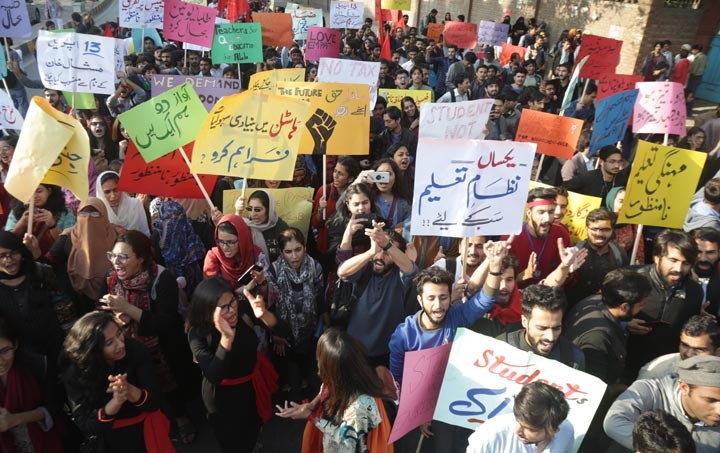
For the first time in the history of Pakistan, students from private and public universities in Lahore marched for the restoration of student unions in different districts of Pakistan

The rally or peaceful protest was held under one banner -- the Progressive Students Collective (PSC). They have staged rallies in eight major cities including Lahore, Islamabad, Karachi, Multan, Quetta, Jamshoro and Gilgit in a short time and everywhere their demands were the same.
Students’ sufferings became unending after student unions were banned in the country. They don’t have their representatives in committees of universities. Haidar Butt, organiser and central member of PSC, said the Zia’s government had blocked the natural ways of expression because of what General Ayub Khan’s government experienced at the hands of student unions. It was agitation started by student unions against Ayub Khan that consequently led to his resignation. Since then rulers of the country became wary of power of student unions. Students and youth are like a barometer of the society that indicates its state of affairs. Students and youth play a leading role in any movement. That is why student unions were banned.
In the absence of unions, administration of universities increased fees due to which dropout ratio among students has increased. Hostel charges have also gone up and no one is ready to check administration of universities. In the past, student unions would check the standards of mess and canteens of hostels and varsities. They used to protest against increase in fee because of which the administration could not take decisions arbitrarily.
"With the ban on unions, the students have also compromised on the quality of education other than standards of mess and canteen," views Haidar Butt. According to him, "harassment of girls by male teachers is reported daily. No one is daring enough to take action against the teachers who harass female students inside the universities. To stop incidents of harassment, union is dire need of the hour," he says. Moreover, he demands representation of students in the committees established in universities.
Adeel Amjad, a veteran activist and central member of Progressive Youth Alliance (PYA), laments that quota for the students of Balochistan and GB has been reduced. He says, "Students belonging to different provinces were coming close to one another. This promoted harmony. They would stand collectively against any repression. Students coming from marginalised community get exposure here."
Adeel Amjad demands quota in every university of the Punjab for Balochi, Sindhi, Saraiki and Gilgiti students. He says restoration of students unions will promote harmony in the country. "Unionisation is a fundamental right of students. They cannot be deprived of it."
First time in the history of Pakistan, students from private and public universities have marched for restoration of student unions. Students from PU, GCU and Forman Christian College (FCC), Beaconhouse National University (BNU), Lahore School of Economics (LSE) and LUMS participated in the march and demanded restoration of union.
VCs/administration of universities and colleges always oppose unions in the educational premises because of some reasons. "Student unions had promoted gun culture in universities and hostels. They spoil the environment of education," says Vice-Chancellor of Government College University (GCU) Lahore, Dr Hassan Amir Shah. "Only one union, Jamiat, became dominant in the universities because of unionisation in the educational institutions. They brought gun culture and promoted violence in educational institutions. Pakistan is fighting a war against terrorism. Universities cannot afford to equip students with guns. We are torch-bearers of knowledge and peace. We provide better educational environment which cannot be compromised. Union leaders go beyond their mandate."
"The hostels are full of guns; unfortunately, a specific group was supported and promoted by the state," Butt challenged VC of GCU. According to him, "Jamiat was supported by the administration of the university as well. Jamiat is functional in universities," says Butt. "Only progressive students were deprived of the right to form a union."
"Voices of dissent were suppressed. Students have been working in the form of groups in universities. They beat male and female students. Only one rightwing union belongs to extreme right party and operates under the umbrella of the administration. The government should have controlled it but it was rather promoted and supported while the space for left reduced," Butt goes on to say.
A debate has started after the solidarity march of students. Many people believe the ban on student unions must be lifted. Activist Ammar Ali Jan says, "Students’ unions were considered nurseries of democracy which guarantees fundamental rights. Unfortunately, nurseries of future politicians were closed. Vacuum in leadership was created consciously." According to him, "Deliberately, right wing politicians were helped to enter national and regional politics. Space for liberal and progressive people has reduced, thus a great vacuum in leadership has been created."
A demand for restoration of students’ unions and students march across the country was a revolutionary step, says Jan. He sees curb on journalists as curb on voice of dissent. "Politicians have been defamed. In such a scenario, Student Solidarity March under one banner is a milestone towards change. In other words we can say we are knocking at the door that leads towards revolution. This shows, our youth are aware of politics in the country and they know their increasing role which is good for the nation."
Murad Ras, Minster for Education, was contacted to know his stance on the issue, but he did not attend the call nor did he respond to the text message sent.
sherali9984@gmail.com